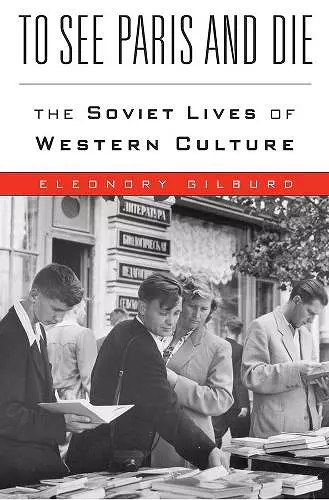To See Paris and Die
The Soviet Lives of Western Culture
Format:Hardback
Publisher:Harvard University Press
Published:30th Nov '18
Should be back in stock very soon

The Soviet Union was a notoriously closed society until Stalin's death in 1953. Then, in the mid-1950s, a torrent of Western novels, films, and paintings invaded Soviet streets and homes, acquiring heightened emotional significance. To See Paris and Die is a history of this momentous opening to the West. At the heart of this history is a process of translation, in which Western figures took on Soviet roles: Pablo Picasso as a political rabble-rouser; Rockwell Kent as a quintessential American painter; Erich Maria Remarque and Ernest Hemingway as teachers of love and courage under fire; J. D. Salinger and Giuseppe De Santis as saviors from Soviet cliches. Imported novels challenged fundamental tenets of Soviet ethics, while modernist paintings tested deep-seated notions of culture. Western films were eroticized even before viewers took their seats. The drama of cultural exchange and translation encompassed discovery as well as loss. Eleonory Gilburd explores the pleasure, longing, humiliation, and anger that Soviet citizens felt as they found themselves in the midst of this cross-cultural encounter. The main protagonists of To See Paris and Die are small-town teachers daydreaming of faraway places, college students vicariously discovering a wider world, and factory engineers striving for self-improvement. They invested Western imports with political and personal significance, transforming foreign texts into intimate belongings. With the end of the Soviet Union, the Soviet West disappeared from the cultural map. Gilburd's history reveals how domesticated Western imports defined the last three decades of the Soviet Union, as well as its death and afterlife.
How and why did Western culture enter the Soviet Union, and what meanings did it accrue for Soviet translators, spectators, and readers? To See Paris and Die explores these questions in new and powerful ways. Brilliantly conceived and beautifully told, Gilburd's book will make a signal intervention into the fields of Soviet, Cold War, and translation studies.--Jochen Hellbeck, editor of Stalingrad: The City That Defeated the Third Reich In a brilliantly written and deeply researched narrative, Gilburd captures the tension between the Thaw's openness to cultural influences from the West--through art exhibitions; youth, peace, and film festivals; world literature; and increasing tourism--and the simultaneous need to 'translate' and render them Soviet.--David Shneer, author of Through Soviet Jewish Eyes: Photography, War, and the Holocaust A captivating, sensual portrait of late Soviet emotional life. Eleonory Gilburd describes how Soviets dreamed their way into another world, the magical, beautiful 'West.' Unfortunately, the real West turned out to be a bitter disappointment.--Kate Brown, author of Plutopia: Nuclear Families, Atomic Cities, and the Great Soviet and American Plutonium Disasters This highly original and readable work is sweeping in its breadth and depth. Gilburd covers a wide range of Western culture--literature, travelogues, art, film, music, theater--and chronicles Soviet reactions to it. Her treatment includes, among other things, the organization of cultural exchange, the distribution of books and films, and the role of Soviet authority figures in mediating the dissemination of Western works. To See Paris and Die will be of great interest not only to political scientists, historians, and specialists in the arts, but to general readers as well.--Katerina Clark, author of Moscow, the Fourth Rome: Stalinism, Cosmopolitanism, and the Evolution of Soviet Culture, 1931-1941 To See Paris and Die is a tour de force by a historian working at the top of her craft. By showing how Western culture was transmitted to and transformed by Soviet audiences, Gilburd has made an impressive contribution to our understanding not only of late-Soviet history but of European history broadly.--Stephen V. Bittner, author of The Many Lives of Khrushchev's Thaw: Experience and Memory in Moscow's Arbat
- Winner of Wayne S. Vucinich Book Prize 2019 (United States)
- Winner of Laura Shannon Prize 2020 (United States)
- Winner of Marshall Shulman Book Prize 2019 (United States)
- Winner of AATSEEL Best book in Cultural Studies 2019 (United States)
- Short-listed for Pushkin House Russian Book Prize 2019 (United States)
ISBN: 9780674980716
Dimensions: unknown
Weight: unknown
480 pages